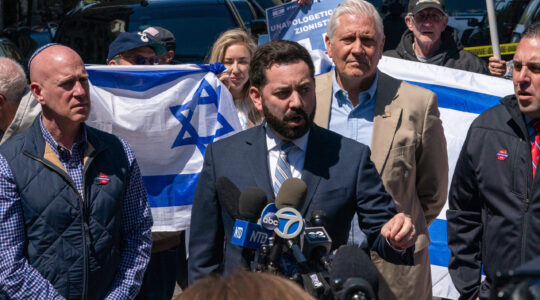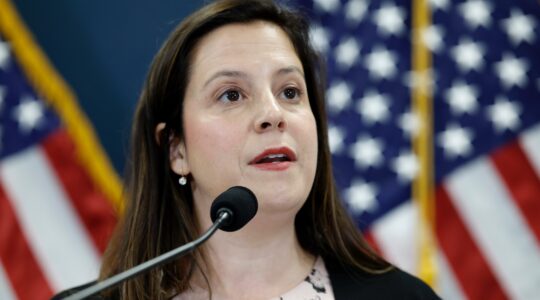WASHINGTON (JTA) — On the campaign trail, Newt Gingrich has given his fellow Republican presidential candidates a wide berth, often going out of his way to praise them. Instead of attacking his rivals, Gingrich has focused his fire on President Obama.
The strategy appears to be paying off.
The former speaker of the U.S. House of Representatives, all but counted out last summer when his frustrated campaign team abandoned him, has come back from the political dead to pull ahead of Mitt Romney in the polls.
Whether Gingrich has been up or down in the polls, one area in which he has been assailing the president’s record is foreign policy, specifically the Middle East.
In a June 12 speech to the Republican Jewish Coalition, Gingrich said he would bring foreign policy “moral clarity” that the Obama administration has lacked.
“Today the greatest obstacle toward achieving a real and lasting peace is not the strength of the enemy or the unwillingness of Israel to make great sacrifices for the sake of peace,” he said. “It is the inability on the part of the Obama administration and certain other world leaders to tell the truth about terrorism, be honest about the publicly stated goals of our common enemies and devise policies appropriate to an honest accounting of reality.”
Gingrich’s RJC speech came at the nadir of his campaign, when key campaign staff left him for, among other reasons, his decision to take a long Greek holiday when other candidates were busy stumping.
The speech reflected the fact that one of Gingrich’s most stubborn redoubts of support has been among Jewish conservatives, many of whom were still appreciative of the checks he put on the Oslo peace process in the mid-1990s when he was House speaker. Chief among the checks was a law that recognized Jerusalem as Israel’s capital. Gingrich has said that his first act as president would be to move the American embassy from Tel Aviv to Jerusalem.
Some major Republican Jewish donors committed to other candidates only after it seemed that Gingrich was not really in the running. But Gingrich is not counted out any longer. According to polls, he leads Romney in early caucus and primary states such as Florida, Iowa and South Carolina, as well as nationally among Republicans.
Gingrich’s surge has resulted in a new focus on his past statements and actions. A veteran of decades in public life, Gingrich has a long record that his opponents are now trawling through for ammunition to use against him.
His foreign policy views have not been immune from such examinations. While Gingrich says that as president he would bring moral clarity to American foreign policy, critics say he often sends mixed signals on the Middle East.
Jennifer Rubin, a conservative Washington Post columnist who backs Romney, dedicated a recent blog post to picking through what she depicted as Gingrich’s flip-flopping on the Iraq War. Rubin quoted reports showing Gingrich, as a member of the Defense Policy Board, helping to plan the war in 2002, and then pronouncing Iraq a no-win proposition in December 2003, when support for the war was still high.
Rubin said this, as well as Gingrich’s equivocation in 2006 on the American military surge that eventually drew Iraq back from chaos, was his “worst betrayal” of Republicans and demonstrated his willingness to place a premium “on political expediency over national security.”
More recently, Gingrich has faced criticism over apparent inconsistencies on Libya. On March 7 he accused Obama of waffling, saying that as president he would immediately and unilaterally impose a no-fly zone. When Obama did just that later in the month, Gingrich said intervention was a mistake.
In a Facebook post, Gingrich attempted to explain: He wrote that by the time of his earlier remark, Obama had already put American prestige on the line by saying that it was time for Libyan dictator Moammar Gadhafi to go. And therefore at that point, Gingrich wrote, “anything short of a successful, public campaign for regime change would have been seen as a defeat for the United States.” But he suggested that prior to the president’s statement, there were preferable alternatives to American military intervention.
Commentators attribute Gingrich’s surge to his strong performance in debates. The former history professor and a best-selling nonfiction writer appears to command a wealth of knowledge on wide range of topics.
“The former speaker of the House is a dab hand at drawing listeners in, for good reason — he showers them with details, facts and history in a degree no candidate in recent memory has even approached,” Wall Street Journal columnist Dorothy Rabinowitz wrote. “Audiences have a way of rewarding such trust.”
Other prominent Jewish conservatives, however, are skeptical of Gingrich’s intellectualism and where it has led him.
Washington Post columnist Charles Krauthammer slammed Gingrich for a 2008 television advertisement that he made alongside then-House Speaker Nancy Pelosi (D-Calif.) calling for action against climate change — an ad for which Gingrich has since expressed regret.
In his column, Krauthammer wrote that Gingrich had made the ad because he was “[t]hinking of himself as a grand world-historical figure, attuned to the latest intellectual trend (preferably one with a tinge of futurism and science, like global warming), demonstrating his own incomparable depth and farsightedness.”
Krauthammer raised concerns about Gingrich’s electability and described him and Romney as “two significantly flawed front-runners.”
Liberals also take issue with some of Gingrich’s manifold political enthusiasms.
Matthew Duss, director of the Middle East program at the liberal Center for American Progress, said that Gingrich’s alliance with elements in the conservative movement that see Shariah, or Islamic religious law, as a threat to the American way of life could have profound foreign policy consequences.
“He’s presented the challenges in apocalyptic terms, which is a real problem,” Duss said.
Gingrich’s freewheeling rhetoric has raised eyebrows, too, in the Jewish community. The American Jewish Committee in May 2010 called on the Republican leadership to condemn Gingrich’s claim in a 2010 book that the Obama administration poses as “great a threat to America as Nazi Germany and the Soviet Union.”
Gingrich at times also appears tone deaf to certain pro-Israel sensibilities. Asked during a Nov. 22 GOP debate whether he would come to Israel’s defense if it should attack Iran, he said, “If my choice was to collaborate with the Israelis on a conventional campaign or force them to use their nuclear weapons, it will be an extraordinarily dangerous world if, out of a sense of being abandoned, they went nuclear and used multiple nuclear weapons in Iran. That would be a future none of us would want to live through.”
Israel’s oft-stated policy is that it would never be the first to use nuclear weapons, under any circumstance. Moreover, Israel has cultivated a posture of ambiguity on whether it possesses such weapons.
Referring to Gingrich’s departure from the Israeli line of nuclear ambiguity, Aaron David Miller, a former top Middle East diplomat in Democratic and Republican administrations, suggested that Gingrich could avoid future faux pas as he accrued experienced advisers now that his campaign was reviving.
“His advisers are going to give him a briefing book, he’s going to read it, and he’s going to say to himself, ‘It’s not a good idea I said that,’ ” said Miller, who is now a scholar at the Woodrow Wilson International Center for Scholars.
Gingrich’s campaign rolled out the foreign policy team earlier this month, as detailed in an article by Foreign Policy magazine’s Josh Rogin. The team appears to be stacked heavily with pro-Israel hawks, including David Wurmser, a former top adviser to Vice President Dick Cheney, and James Woolsey, a former CIA director.
Leading the team is Herman Pirchner, who leads the American Foreign Policy Council, a Washington think tank on whose board of advisers Gingrich sits. The think tank’s vice president, Ilan Berman, also is on the Gingrich team, Rogin reported.
Pirchner declined to comment, saying requests for interviews should be routed through the campaign. Multiple requests to the Gingrich campaign for this story went unanswered.
Some Jewish conservatives had praise for the Gingrich campaign’s foreign policy team.
“They leave a strong paper trail,” said Jim Colbert, policy director at the hawkish Jewish Institute for National Security Affairs.
It was a team, Colbert said, that would mitigate what he saw as the damage done by the Obama administration’s policy of making Israeli-Arab peace a centerpiece of its Middle East strategy and its practice of criticizing Israel for actions it deemed counterproductive to that effort.
“It’s a team that would move forward with peaceful relations with” other countries in the region, Colbert said, “but the U.S.-Israel relationship would not be dependent on that.”
Sarah Stern, the president of EMET, the Endowment for Middle East Truth, said that Obama’s policy of engagement with autocracies in the region had proven a failure. Both Gingrich and Romney seemed to understand this, she said, as evidenced by the people they chose for their teams.
“The understanding is that there are bad actors in the world and we can’t sit down and have detente with every one,” she said. “Some of us interpret all this openness as weakness.”
Miller said that Gingrich’s “moral clarity” posture may serve him well in the primaries but was not likely to give him much traction in the general election.
Obama has “whacked four times as many bad guys with drones” as President George W. Bush did, Miller said.
“He killed Osama bin-Laden, he’s been much more careful than Bush about the gap between rhetoric and deed, which has been important for U.S. credibility. People feel more secure,” added Miller, who separately has been sharply critical of what he sees as Obama’s overreaching on Israeli-Palestinian peace efforts.
Miller suggested that if Gingrich were elected president, he would revise Bush’s “freedom agenda,” pushing democratization but with more caution, and would re-establish the emotional bond with Israel that Miller says Obama lacks.
“He sees Israel through a different filter,” Miller said of Gingrich. “He’s more in line with Reagan, Clinton and Bush, who had an emotional bond with Israel as an ally.”
JTA has documented Jewish history in real-time for over a century. Keep our journalism strong by joining us in supporting independent, award-winning reporting.





